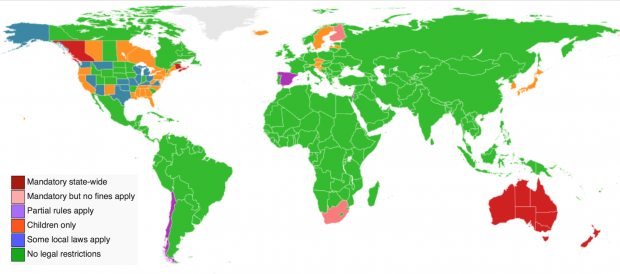Bike Laws Worldwide
How to regulate biking as a means of transportation is something that many jurisdictions are grappling with. In this installment of our Bike Safety series, we look at the different ways countries deal with bikes through legislation and discuss what solutions have been the most effective.
Legally speaking, what are bikes? Should they be treated like a car? Should they not? If not, how should they be treated? These are not necessarily easy questions to answer and different jurisdictions both in the US and worldwide are trying to figure them out. As might be expected, lots of different solutions have been proposed, so we see a lot of diversity in terms of actual laws and regulations. Below I'll explore these differences with respect to helmet laws and bike DUIs, two subjects that I've already covered with blog posts about the rules in Champaign-Urbana.HistoryWhile bicycles, in some form, have been around for hundreds of years, it wasn't until the nineteenth century that they assumed their present form and it wasn't until late in this century that bikes became a popular form of transportation. As such, before the 1880s or so, there was little need for bike laws. The first law pertaining to bicycles in the US was passed by the New York State Legislature in 1887 and it stipulated that bikes were to be treated as a type of carriage, giving them the same rights and obligations. A similar law was established in 1888 in England. The basic effect of these laws was to (a) ensure that bikes could not be banned for street use and (b) to be able to enforce traffic laws in a standardized fashion.The BasicsIn 1968 Vienna Convention on Road Traffic, an international treaty ratified by 73 countries meant to establish some degree of standard traffic regulations among signatories, defined a bike as a vehicle, ensuring the right of bicyclists to use roads in these countries.Helmet LawsWhen you talk about bike laws, the first thing that comes to mind is probably helmet laws. There's a lot of variation in whether or not and for whom helmets are required.As is visible, nation- or state/province-level helmet laws are relatively rare. In terms of nations, we just have Australia and New Zealand. In addition to this, three Canadian provinces require helmets, New Brunswick, Nova Scotia, and British Columbia. Lots of jurisdictions opt for laws that require children to wear bike helmets.This graph, which plots percentage of cyclists having head injuries (red) in accidents with percentage of cyclists wearing a helmet (blue), looks at data from New Zealand, which implemented a nationwide helmet law in 1994. The effectiveness of both helmets and helmet laws are quite clear. We discussed this issue in more detail in a past blog post that you can check out if you want to see more stats. My bet is that in a few decades' time, helmet laws will be seen as about the same as seatbelt laws: perhaps a little intrusive, but definitely helpful.DUIAs we discussed in an earlier post, biking while intoxicated is associated with an increased chance of death. In Illinois, it cannot result in a DUI, though this isn't true for all states.The law isn't always entirely clear as to whether someone on a bike can get a DUI. Only those states in medium and dark blue clearly define a DUI as not including bikers. Another issue is that of a BUI. In those states in dark blue, according to the Decatur law firm, separate laws have been passed defining biking while under the influence as illegal, but as something with different penalties than a DUI. It's actually pretty hard to find information on bike DUIs, or their equivalents, outside of the US. The UK, it's illegal to bike while in a condition that renders you unfit to operate a bike, which could include intoxication from alcohol. A similar law applies in Denmark, with a fine of $75-$150. In Australia, it might be possible for you to be charged under a statue about publicly operating a carriage, but this is also separate from the charges related to operating a motor vehicle while drunk. As far as I can tell, there's no law related to drunk biking in Spain. In Japan, the penalty can be up to five years in prison and a fine of ¥1,000,000 (~$8,400).
_______
The diversity that we see now is probably not something that will hold much longer. True, we'll always see regional differences based on the varying ways in which bikes are culturally understood and based on the differences in how they are used, but I think that in twenty years' time, laws will be have a much lower degree of variation both within and between countries.Know about any weird differences in bike laws worldwide? Join the discussion!




